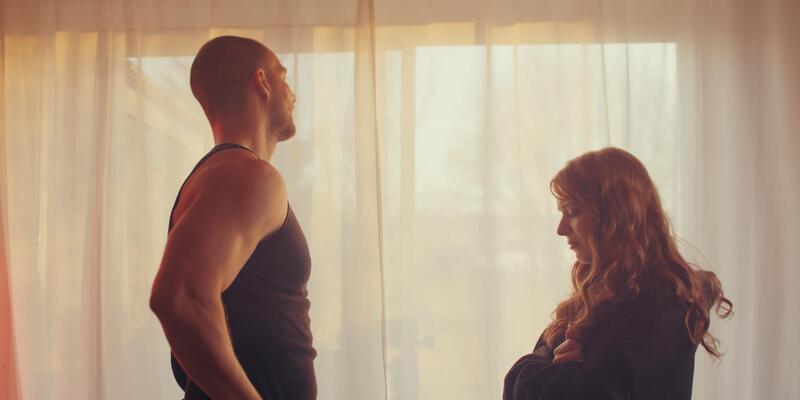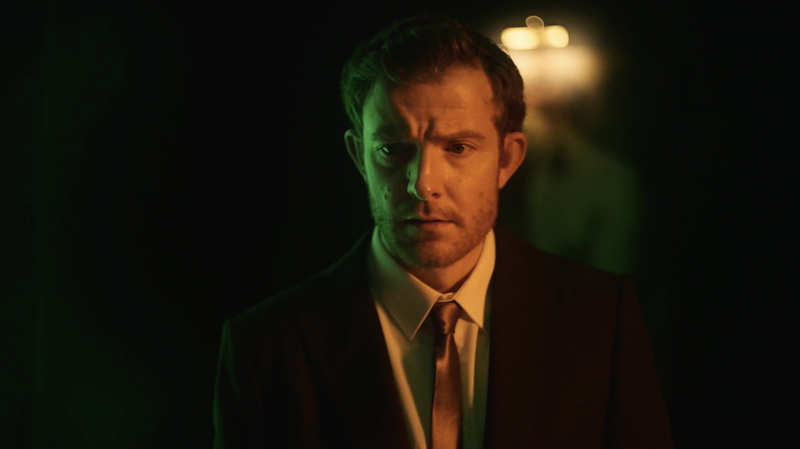
Can Affection Survive the Allure of Ambition?
MOVIE REVIEW
Waverly
–
Genre: Drama
Year Released: 2025
Runtime: 17m
Director(s): Marie-Pier Diamond, Gilles Plouffe
Writer(s): Christos Skentos
Cast: Romy Victory, Jean-Sébastien Loiselle, Christos Skentos, Gilles Plouffe
Where to Watch: shown at the 2025 Fantasia Film Festival
RAVING REVIEW: There’s giant dramatic fallout or grand romantic gesture in WAVERLY—just two people trying to hold on to each other as the world quietly pushes them apart. Clocking in at just 17 minutes, this short drama lands a surprisingly potent emotional punch, grounded in subtle performances and a setting that feels lived-in rather than staged. Co-directed by Marie-Pier Diamond and Gilles Plouffe, it’s the kind of story that doesn’t ask for your attention—it earns it. It’s rare to see a short that doesn’t try to extend beyond its framing. This is exactly what it sets out to be and knows that from the first frame.
Set in contemporary Montréal, the film follows Jenna (Romy Victory), a barmaid navigating life’s daily drudgery, and Max (Christos Skentos), a bouncer carrying the weight of his silence on his shoulders. Their connection isn’t explosive or cinematic in the traditional sense—it’s small, uncertain, and maybe even fragile. But that’s precisely what makes it resonate. The script by Skentos opts for realism over melodrama, anchoring this tale of romance in economic pressure, quiet longing, and the push-pull of ambition.
One of WAVERLY’s most notable achievements is how it conveys so much with so little. It doesn’t overexplain the stakes or draw out conversations that don’t need to happen. Instead, it drops the viewer into a world where glances matter more than declarations, and the environment—the city itself—acts as both a supporting character and an antagonist in its own way. We’re not told Montréal is unrelenting, but we feel it in the muted color palette, the tight spaces, the way Jenna and André seem to fit together, like puzzle pieces that almost work—until they don’t.
Victory brings a grounded sincerity to Jenna. She’s a character pulled in every direction—financial anxiety, emotional hesitation, ambition—and captures that conflicting struggle with an understated vulnerability. Skentos, a theatre-trained performer, counters her beautifully with a performance marked by restraint and uncertainty. Their chemistry is subtle, maybe even deliberately fragile, echoing the broader themes of transience and risk.
As a co-director, Diamond also handled cinematography duties, and her visual approach reinforces the story’s emotional feeling. The camera stays close but never intrusive, often letting moments breathe rather than cutting too quickly. There’s a roughness to the visuals, a graininess that enhances the authenticity of the piece. Israel Dupuis’ score is used sparingly but effectively, never overwhelming the scenes but providing just enough support to amplify key emotional beats.
What may divide audiences is the film’s quietness. There’s a stripped-down nature to WAVERLY that might feel unfinished or too open-ended for some. It doesn’t build to a payoff or spell out its themes with expository dialogue. For viewers expecting a clear conclusion, it might leave them wanting. But that ambiguity is part of its strength. The film is less about resolution and more about evoking a moment in time—one where love, opportunity, and survival clash beneath the surface.
Thematically, WAVERLY feels like a direct reflection of the socioeconomic unease that defines much of today’s dating landscape. The romance here isn’t just between two people—it’s between the life they might want and the reality they’re stuck in. Ambition hangs over the film like a third character, one that promises liberation but also threatens to unravel what little peace the couple has found. It’s a powerful metaphor delivered with minimalism and restraint.
What’s perhaps most striking is how relevant this story feels, despite its small scale. The intersection of romance and economics isn’t a new narrative thread, but few films—especially short films—dare to linger in that uncomfortable space without offering escape. There’s no dream job, no sudden windfall, no grand pivot here. Just two people are deciding whether love is enough, or if survival must come first.
WAVERLY succeeds most in its emotional specificity. It’s a film that could only come from the minds of creators deeply connected to the modern pulse of urban life. It doesn’t offer solutions, but it does pose a question that will echo for viewers long after the credits roll: in a world where survival feels like a full-time job, what’s left for love?
Please visit https://linktr.ee/overlyhonestr for more reviews.
You can follow me on Letterboxd, Instagram, Twitter, and YouTube. My social media accounts can also be found on most platforms by searching for ‘Overly Honest Reviews’.
I’m always happy to hear from my readers; please don’t hesitate to say hello or send me any questions about movies.
[photo courtesy of TUESDAY NIGHT PRODUCTIONS]
DISCLAIMER:
At Overly Honest Movie Reviews, we value honesty and transparency. Occasionally, we receive complimentary items for review, including DVDs, Blu-rays, CDs, Vinyl Records, Books, and more. We assure you that these arrangements do not influence our reviews, as we are committed to providing unbiased and sincere evaluations. We aim to help you make informed entertainment choices regardless of our relationship with distributors or producers.
Amazon Affiliate Links:
Additionally, this site contains Amazon affiliate links. If you purchase through these links, we may receive a commission. This affiliate arrangement does not affect our commitment to honest reviews and helps support our site. We appreciate your trust and support in navigating these links.



Average Rating